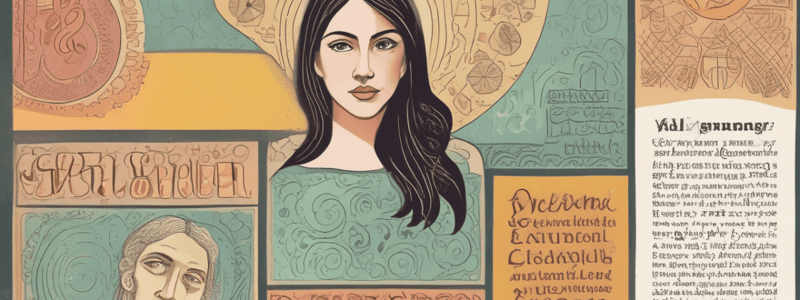Podcast
Questions and Answers
How do you form the past participle of -ar verbs in the perfect tenses?
How do you form the past participle of -ar verbs in the perfect tenses?
Remove ar and add ado
What are the two options for forming reflexive verbs in the perfect tenses?
What are the two options for forming reflexive verbs in the perfect tenses?
Put the reflexive pronoun before the conjugated verb, or put the reflexive pronoun after the infinitive verb
What is the formula for forming the Futuro Perfecto (Future Perfect) in Spanish?
What is the formula for forming the Futuro Perfecto (Future Perfect) in Spanish?
Haber in the future tense + Past Participle
How do you form the past participle of -er/-ir verbs in the perfect tenses?
How do you form the past participle of -er/-ir verbs in the perfect tenses?
What is the Condicional Perfecto (Conditional Perfect) used to describe?
What is the Condicional Perfecto (Conditional Perfect) used to describe?
What is the correct way to form the perfect tense in Spanish?
What is the correct way to form the perfect tense in Spanish?
How do you form the negative of the perfect tense in Spanish?
How do you form the negative of the perfect tense in Spanish?
How do you form the negative of reflexive verbs in the perfect tense in Spanish?
How do you form the negative of reflexive verbs in the perfect tense in Spanish?
What is the correct way to translate 'I had already eaten when I arrived at the party' into Spanish?
What is the correct way to translate 'I had already eaten when I arrived at the party' into Spanish?
What is the correct way to translate 'I will have finished all of my exams' into Spanish?
What is the correct way to translate 'I will have finished all of my exams' into Spanish?
Flashcards are hidden until you start studying
Study Notes
Los Tiempos Perfectos (The Perfect Tenses)
- 'I have just' tense is formed using Acabar + de + Infinitive, e.g., Acabo de hablar (I have just spoken)
- The 'I have just' tense is used to describe an action that has been completed in the immediate past
Los Tiempos Perfectos Formations
- Pretérito Perfecto (Present Perfect): Haber + Past Participle, e.g., Yo he hablado (I have spoken)
- Futuro Perfecto (Future Perfect): Haber + Past Participle, e.g., Yo habré hablado (I will have spoken)
- Condicional Perfecto (Conditional Perfect): Haber + Past Participle, e.g., Yo habría hablado (I would have spoken)
- Pluscuamperfecto (Past Perfect): Haber + Past Participle, e.g., Yo había hablado (I had spoken)
Irregular Verbs
- Decir: dicho
- Hacer: hecho
- Poner: puesto
- Ver: visto
- Abrir: abierto
- Volver: vuelto
- Romper: roto
- Escribir: escrito
- Descubrir: descubierto
- Cubrir: cubierto
- Freír: frito
- Morir: muerto
- Resolver: resuelto
Examples
- Le he escrito (I have written to him)
- Hemos hecho muchos pasteles (we have made many cakes)
- Habré terminado todos mis exámenes (I will have finished all of my exams)
- Habría ido a la fiesta si no estuviera tan cansado (I would have gone to the party if I wasn't so tired)
- Lo habrías comprado si tuvieras el dinero (you would have bought it if you had the money)
- Ya había comido cuando llegué a la fiesta (I had already eaten when I arrived at the party)
- Ya había abierto la ventana cuando mi madre me pidió que lo hiciera (I had already opened the window when my mother asked me to do it)
Negatives and Reflexives
- To make the perfect tense negative, add "no" in front of the "haber" part, e.g., No he comprado nada (I haven't bought anything)
- For reflexive verbs, add the reflexive pronoun in front of the "haber" part, e.g., Se ha despertado (He has woken up)
- To make reflexive verbs in the perfect tense negative, add "no" in front of the reflexive pronoun, e.g., No se ha despertado (He has not woken up)
Studying That Suits You
Use AI to generate personalized quizzes and flashcards to suit your learning preferences.




